Joe Noble: the pipes|drums Interview from the Archives – Part 1
When the great pipe band drummer, leader, teacher, and judge Joe Noble passed away on August 31, 2024, at 82, he left an indelible mark on the piping and drumming world and its history.
A World Solo Drumming Champion and longtime lead-drummer of Grade 1 Renfrew, which would evolve through a series of identity changes to become British Caledonian Airways (Renfrew), Babcock-Renfrew, Power of Scotland and, ultimately, the ScottishPower of today, Noble was known as a “piper’s drummer,” the ultimate compliment a pipe band drummer can receive from pipers. Indeed, he cited great pipe-majors like Tom Anderson and Iain MacLellan as a few of the biggest influences in his drumming career.
He served many years as one of the RSPBA’s senior judges, assessing dozens of championships, often as an ensemble adjudicator.
In 1997, we were fortunate to meet with him at his home in the Glasgow suburb of Bearsden for an exclusive and copyright pipes|drums Interview. We met with him a few days before the World Championships. He was, as always, gracious and congenial. He wanted to talk about piping just as much as drumming. True to form, he had no trouble commenting freely and frankly on any topic.
To help preserve his place in modern and future memory, we are pleased to bring readers the pipes|drums Interview from November 1997 in two parts, beginning with the original introduction.
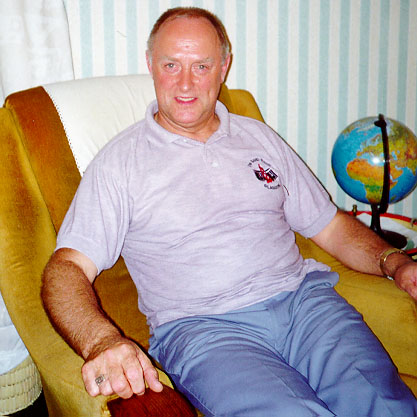
Joe Noble is a prime and rare example of great talent, intense intelligence, and genuine kindness combined in one person. One. of today’s most popular and respected exponents of piping and drumming, he does not hesitate to express his feelings, however outspoken they may be. When Joe Noble talks, people listen.
As a highly regarded member of the Royal Scottish Pipe Band Association’s judges panel, Noble is directly in touch with the activities of that organization. As a former top player, he is also in tune with the thoughts of pipers and drummers worldwide. He has strong opinions about the current state of pipe band competitions and how the RSPBA governs them. He is concerned that the organization risks drifting away from the players’ desires and wishes due to it becoming overly bureaucratic.
Joe Noble communicates his thoughts rationally and thoughtfully. When he speaks, it is in a positive and expressive style, able to convince the listener that he always has the players’ thoughts and well-being at heart. He has an excellent sense of humour, and it’s no wonder he is so well-liked by peers and players alike.
His thoughts on piping and pipe bands are as intelligent as anybody’s – piper or drummer. Although he never has taken piping lessons, Noble clearly understands light music’s nuances. His philosophy on pipe band drumming is purely lucid, and his appreciation of pipe music is perhaps unmatched.
He always stresses the “team” approach to pipe bands and communication between pipe-major and leading-drummer, between pipers and drummers, as critical to a band’s competitive and emotional success. With that in mind, it’s perhaps no surprise that Noble and his bands enjoyed the accomplishments they did as a result of his own keen communications skills. Joe Noble was born in Fraserburgh, Aberdeenshire, in 1942. Neither of his parents were connected with piping or drumming but, about five years after the Noble family moved to Glasgow in 1949, Joe started drumming lessons with the local Boys’ Brigade band.
His talent for drumming was immediate, and he progressed rapidly with the 214 Boys’ Brigade Pipe Band until he was good enough to play with the Grade 1 Renfrew Pipe Band. He stayed with Renfrew for an impressive 23 years, most as leading-drummer. While with the band, Noble was surrounded by great piping and drumming talent, including Iain MacLellan, Alex Connell, Andrew Hosie, George Hunter, Robert Turner, and Tom Anderson, who, as pipe-major of Renfrew, had a distinct impact on Noble’s career.
His competitive drumming career was impressive, especially considering he played at a time when the great Alex Duthart was his contemporary. In 1972, Joe Noble won the Scottish Pipe Band Association’s Challenge Trophy for drummers, which was the equivalent of a World Solo Championship. When the association created the World Solo Drumming Championship in 1975, Joe Noble was its first winner. With Renfrew, Joe Noble guided his drum corps to a World Drumming Championship title in 1974, and also won the drumming at the Cowal Championship four times (1968, ’71, ’73, ’75).
In 1982, he was coaxed out of retirement after only a few months when he agreed to lead the drum corps of the Grade 2 Toyota Pipe Band, which dominated that grade for several years until it was promoted to `Grade 1. When the Toyota band folded in 1986, Joe Noble retired from competitive drumming and started The Band Room, a business dedicated to supplying bands and orchestras of all types with equipment. With Iain MacLellan, his partner in The Band Room, Joe Noble’s shop on West Regent Street in Glasgow is a social centre for pipers and drummers year round, and becomes especially busy the week before each World Championship. On August 14, 1997, pipes|drums met Joe Noble at his home in Bearsden, Scotland.
pipes|drums: How did you get started in drumming? Who were the people most active in your drumming career?
Joe Noble: I got started in drumming in the Boys Brigade in the middle to late 1950s. I was quite fortunate to be in an area where the local 214 Boys’ Brigade was a highly prominent Juvenile pipe band. My first tutor was a fellow called George Hunter who played with the Renfrew Pipe Band and was later leading-drummer of the Red Hackle Pipe Band, and also the Milngavie Pipe Band towards the end of his career. Through the Boys’ Brigade I was also sent for additional tuition to Alex Healey, who was the leading drummer of the Renfrew Pipe Band and a World Solo Drumming Champion. He had quite an influence on my early development.
The 214 at that time was very successful competitively. Our arch rivals then were a band from Fife, the Lochore Juveniles. I think Robert Shepherd came from that section, and some good drummers, like David Split and many others.
p|d: When did you join the Renfrew Pipe Band?
JN: I left the Boys’ Brigade around 1960 to join Renfrew. The leading drummer of Renfrew at that time was another ex214 player named Robert Laverty. Robert left and joined Muirhead & Sons, and a fellow named Andy Hosie took over. I was very happily ploughing away on the flank, just doing my thing. Then Andrew picked up a very good job and had to leave, and I was literally pitchforked into the leading drum job – not something I’d really thought much about. I didn’t think I’d ever be a Grade 1 leading drummer, although it was always my ambition as a wee boy to maybe be a leading drummer who could actually get a drum corps to beat Alex Duthart’s drum corps. That would be the second-best thing to playing in Alex’s drum corps.
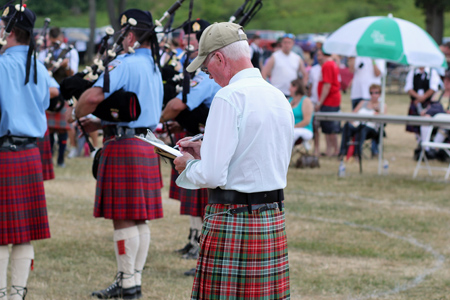
The people who had the highest influence on my thoughts and playing would be the late Alex MacIver, who was pipe-major of the 214. He was a stickler for drummers listening to pipes, and he had some very interesting ways of making sure that you paid attention to things.
One of his little tortures was to make sure that the drummer was aware that the strathspey is a dance, and if you didn’t pick up the rhythm correctly, then you’d have to put the drum down, and the pipers would play, and the drummers would be asked to do a pas-de-bas, which was, of course, good fun for the pipe section. But it worked because not only did the band turn out some great pipers like Iain MacLellan, but drummers like Alex Connell, Andy Hosie, George Hunter, and Bobby Turner.
Tom Anderson, who was pipe-major of Renfrew, and A.D. Hamilton, one of my tutors, were great influences as my drumming career progressed.
p|d: How long were you with Renfrew?
JN: I stayed with Renfrew continuously through seven or eight changes in the organization for 22 years. I think about 16 of those years I was leading-drummer. During that period, the name changed from the Renfrew Pipe Band, to the British Caledonian Airways Renfrew Pipe Band, then to Babcock-Renfrew Pipe Band. So, although it sounds like I played in three bands, it was all just the same band but with different sponsorships.
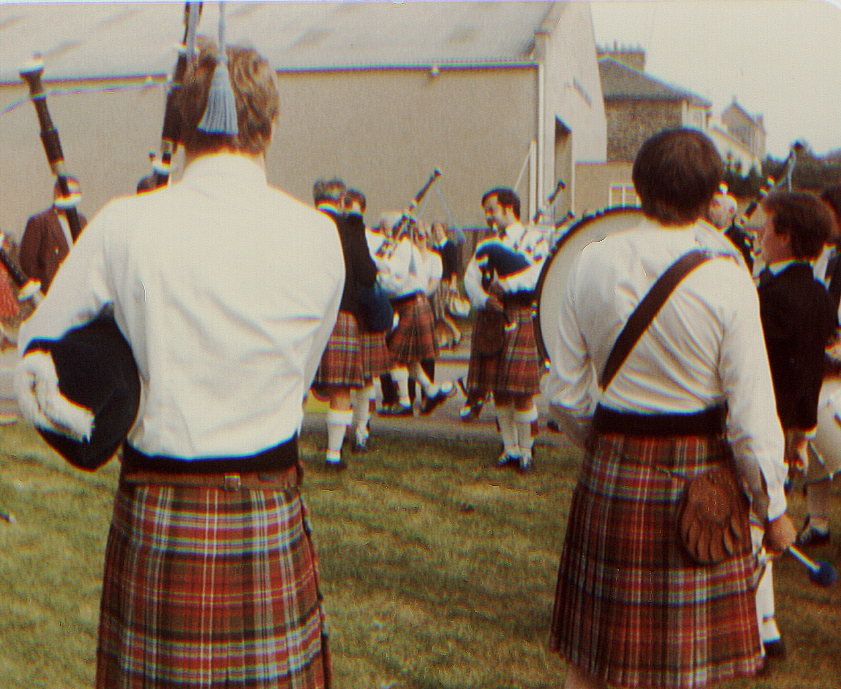
p|d: You also went on to play with the Toyota Pipe Band.
JN: Yes, with [Pipe-Major] Hugh MacInnes. When I left the Renfrew band, I intended to take a year or two off, but it was actually a month or two off as it worked out. Toyota was in Grade 2, and they had a very good pipe corps, they needed something more happening at the back of the band, and they asked me to go down. I had misgivings about going down because the last time I had played in Grade 2 was many years previously as a juvenile, where we had won Grade 2 championships when you weren’t restricted to your grades, but when I went down and heard the pipe corps, that convinced me that it would be a good slot. So, we had one year in Grade 2, and the band was promoted to Grade 1.
p|d: Okay, now that we know a bit of your history, we’d like to hear your thoughts on a few controversial things. We’ll start with this: do you believe that “Best Drum Corps” awards are good for pipe bands?
JN: I could be a devil’s advocate on this one and argue both sides. I believe the drum corps prize was introduced in the late 1920s. The first one was, as far as I am aware, the Douglas Trophy for drumming at Cowal. A.D. Hamilton advised me that the drum corps prize was introduced to raise the standard of drumming because, in those days, drummers just played simple military patterns, and as the pipers were getting more erudite and wanted to play heavier tunes with different compositions, more flow and substance, then the simple beat of the drum wasn’t always applicable. Enlightened drummers at that time, like Hamilton and Paddy Donovan, had a huge input on the game, and drum scores for specific tunes were coming through, as opposed to just a 2/4 beating or whatever. The drumming prize probably accelerated drumming technique. So, you could say that the best drum corps prize has served its original purpose.
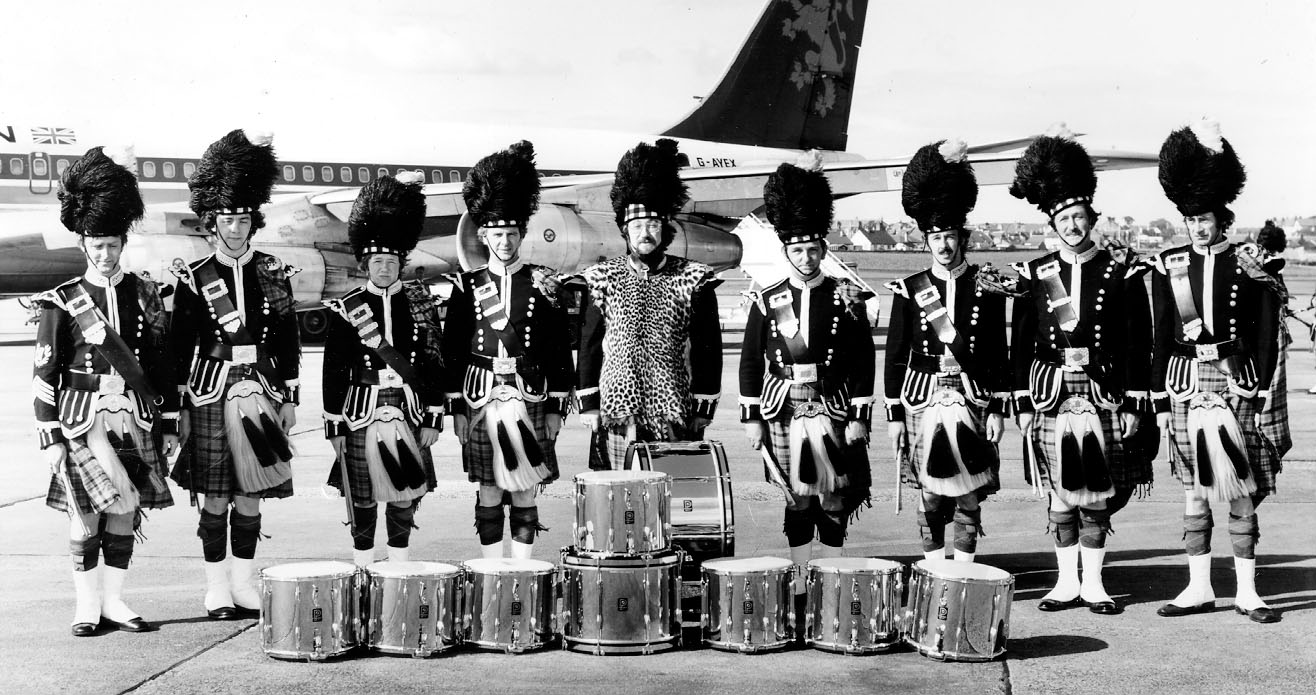
But it quite possibly has outstayed its welcome. On the other hand, it has now become almost a tradition to have the drumming prize. I think that drummers, certainly over here, would be rather upset at the prospect of losing the opportunity to compete for the drumming prize. In my experience in drumming, you do tend to lose your way at times, and early on I chased the drum corps prize. It was A.D. Hamilton who put me on the right track, and I found that the more I played for the pipers, the drum corps prizes came. You can still produce a very rhythmic accompaniment and win the drumming prize.
The drumming adjudicator’s duty is almost like that of an ensemble judge: to assure that the drum corps is accompanying and enhancing the melody. Some leading drummers do it better than others; some do it with panache, and some can maybe barely do it. The two main functions of the drum section are to keep time and to accompany. And if an adjudicator gives a prize to a drum corps that is flying off at a tangent and producing all kinds of rip-roaring feats of percussional dexterity, and the pipe corps just happens to be there, well, they shouldn’t be getting the drumming prize. But I think that most of the prizes today are being awarded to drum corps that can produce good rhythmic accompaniment but still show off their expertise and enhance the piping.
“Musicality is the prerequisite of being a musician.”
p|d: Would you agree that today’s drum corps are accentuating the musical over the technical, or vice versa?
JN: I would certainly like to think they are accentuating the musical over the technical. I think you’ve got to look at the development of the instrument. The instrument has developed into a very high precision instrument where poor technique shows up very clearly, so a good technique is a prerequisite of being a good drummer. Musicality is the prerequisite of being a musician. So I would think that it is very important that both sides are married.
p|d: Talking about the quality of today’s side drum as an instrument, do you think drumming in general will get more elaborate as a result of technical advancement?
JN: No, I don’t think drumming will get more elaborate, although I may be proved wrong. In fact, I would think that, if anything, it has peaked, and it is now descending to a more musical plane. The drum of today not only shows how clever you are at open patterns, but it also shows that we can sometimes be a wee bit less than good at producing a good closed roll, which is the essence of pipe band drumming. The closed roll is the only thing we do differently from other rudimental drummers, and listening to poor roll quality is like listening to poorly blown pipes.
p|d: Do most judges reward musicality and accompaniment over technical brilliance?
JN: I would like to think that that is what the judges are trying to do. I know that some of the panel feel that we should be educators, as well as adjudicators, and you do your best to educate, but sometimes it is very difficult when bands are coming at you thick and fast and you’ve got about seven minutes not only to listen to them but to try to put something sensible on the sheet. I would like to think that when competitors look at the score sheet, they could say, “Yes, that happened,” or maybe, “I don’t agree with that,” or else they could talk about it afterwards.
“If an adjudicator gives a prize to a drum corps that is flying off at a tangent and producing all kinds of riproaring feats of percussional dexterity, and the pipe corps just happens to be there, well, they shouldn’t be getting the drumming prize”
Scoresheets should be constructive. In my opinion you must follow the performance with your pencil. If you try to be grandiose and write high flowing musical terminology on an abstract basis, suddenly the band has moved on three tunes and you don’t know where the hell you are. You have to follow the presentation.
If an adjudicator gives a prize to a drum corps that is flying off at a tangent and producing all kinds of riproaring feats of percussional dexterity, and the pipe corps just happens to be there, well, they shouldn’t be getting the drumming prize.
p|d: It must be difficult as a judge to listen to a technically brilliant drum corps of ten sides, and judge them against another a smaller corps that helps the ensemble more.
JN: That’s where you’ve got to make difficult decisions based on your own background and your own standards. I think that when you’ve got ten snare drummers versus four snare drummers. you’d have to hear the band and ast whether ten are too many, how many pipers are playing and what kind of volume did they have, and what is the overall balance. If the balance of drums totally outweighs the volume of pipes, then the jo hasn’t been done properly. The drum section with four snare drummers is may! better balanced and the musicality is on better level. As with piping, it doesn’t: ways follow that volume is doubled numbers are doubled. More drums result in a thicker, richer sound if you’re rolling properly. The balance has got to be attained and it’s something that has to done with the pipe-major and the lead-drummer working together. It is possible to take a big drum corps onto the field and have them not overshadow the pipes, but I think they’d have to be technically very efficient, with excellent dynamics and control.
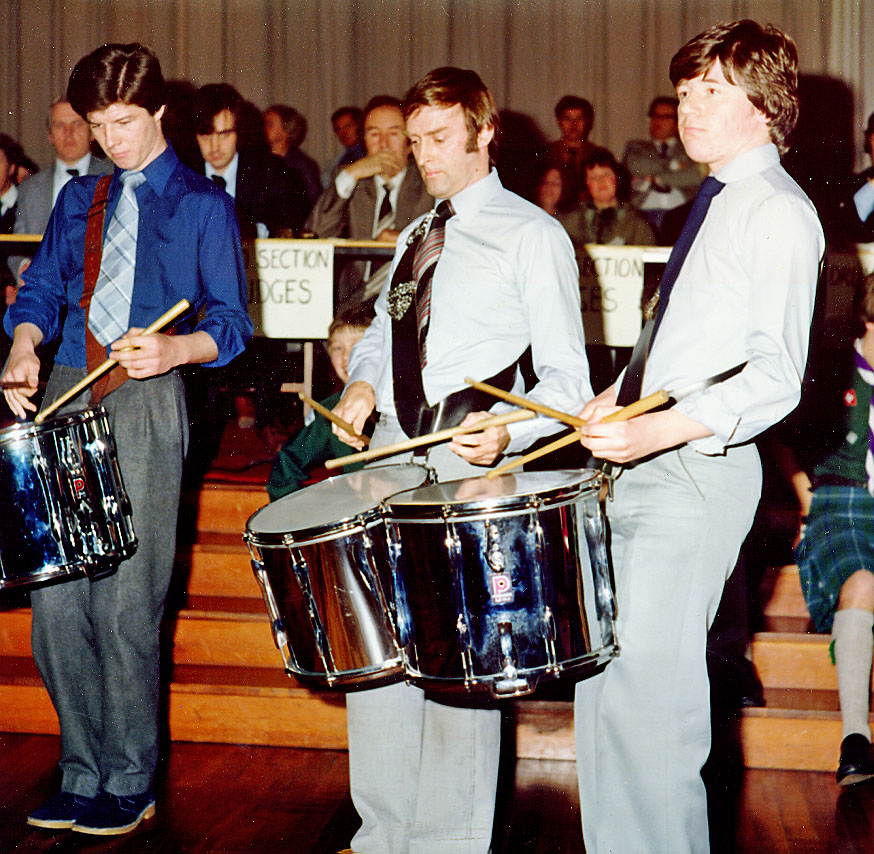
p|d: When writing a drum score to a tune, what are the most important things to remember?
JN: Before anything else, you’ve got to be aware of the melody. You’ve got to be conversant with the tune. It’s highly important that you discuss the melody with the pipe-major so that you’re comfortable with it, and you know that he hasn’t set you a task that you know you’re going to have difficulty in accomplishing. It’s very important that the right quality of music is presented.
Then, record the melody, because, irrespective of how well you can read music, you’ve got to hear the melody because you’re dealing with sound. Before you even put pen to paper or stick to pad you should be fully aware of the melody. You should be able to whistle along to it. Be aware of the parts the pipe-major wants highlighted, and then you sit down and try to fit your patterns to this melody. Look for opportunities to highlight both the pipe section and the drum corps. Sometimes the best thing to do is nothing. A short rest can make a tremendous impact on the melody, so look for those opportunities and try to find as many musical opportunities as you can. You can always get the basic rhythmic flow of the tune by simply tapping out the notes as a monotone exercise. Then tap out the melody as a horizontal and that will give you other ideas. I like to think that you should start with the ending, because it’s going to be played so many times. You should ensure you’re going to play something pleasant, which can be enjoyed several times over.
p|d: Are pipe tunes for bands increasingly being written for the drum section?
JN: No, I think that a lot of the tunes that are being written just now are very strong in rhythm and syncopation, and maybe sometimes lacking a wee bit in melody. Sometimes there is so much rhythmic pulsating in the piping that the drummers are almost redundant, and by the time they come in sometimes the clever thing to do is to just go back to a basic pattern so that you’re not just putting syncopation on top of syncopation.
There are many new tunes being written, and some of them are very good and some of them are not very good. I think that goes for everything. I’m not being derogatory towards the modern composers, many of them are producing very good tunes, but every tune isn’t a hit. A lot of the tunes won’t stand the test of time, and, in fact, don’t stand the test of five minutes. If you hear it and you can’t remember it, then it isn’t a winner. Many modern tunes that are popular have a very melodic line, and the ones that aren’t – mainly two-parted jigs don’t really stand the test. I don’t mean to be nasty, and it’s a great idea for pipers to compose, but the fact that you write two or three tunes doesn’t make you a composer. It’s all part of a learning process. Maybe if you write 53 tunes, then you might come up with some really good stuff. But we don’t really need to listen to the first 53.
p|d: It seems like there is a lot of pressure for bands to come up with new tunes, even in the lower grades, and inevitably they are written by band members.
JN: And some of the tunes are good, and you can get good tunes from unlikely sources. I’ll go back to `Grade 1 at the World Championship. The ultimate test might be how many tunes by modern composers are played in the March, Strathspey & Reel arena. Not many. Why don’t the current and aspiring composers make is a goal to write a good tune that another band will play in an MSR?
p|d: What’s the ideal pipe section for a drum corps?
JN: That’s a very difficult question. The ideal pipe section would come from having the ideal pipe-major. There are as many good pipe bands in the world today as there are good pipe-majors. The pipe-major is so influential in the band and to the band that you can’t overestimate his standing. To have a good pipe section the man at the helm has to be a good technician, an excellent tone man, a “man manager,” and someone very interested in and responsive to the drummers’ business, their abilities, and what they are capable of giving him. The perfect pipe section for drummers would probably be one where the pipe-major met all of those criteria. I’d like to add that Tom Anderson was a man who met all of the criteria.
p|d: Why do you think drummers tend not to be respected by some pipers?
JN: There’s always been banter between pipes and drums, like drummers saying pipers are excellent when you’re marching into a wind, but that’s just a bit of patter. That kind of banter is good for a band, it helps band morale. But if the pipers genuinely don’t like the drum corps, the drummers should leave. My views have changed over the years. I no longer think it’s a good idea to persevere, to soldier on, to be loyal to a band if you’re no longer enjoying it. It’s a hobby. If things aren’t happening, make them happen somewhere else, and move on. Your playing career is too short to waste time being unhappy with a band.
“Practices should be efficiently run, particularly nowadays when time is not always freely available to people. The time that band members commit is precious. Practices must be structured.”
p|d: Along those lines, often when a leading drummer goes to another band, the rest of his corps follows. Why is this?
JN: It often happens because they like the guy’s style, his management and they want to play the stuff that he is playing.
“Practices should be efficiently run, particularly nowadays when time is not always freely available to people. The time that band members commit is precious. Practices must be structured.”
They might also agree with the point he’s trying to make. I think it all goes back to respect. Say a new pipe-major is appointed. You can give him a degree of respect because he is in that position, but ultimately the respect is something that has to be earned. If he doesn’t merit respect, then don’t waste your time. People don’t particularly enjoy playing with someone they don’t respect.
Stay tuned for Part 2 of Joe Noble: the pipes|drums Interview from the Archives.


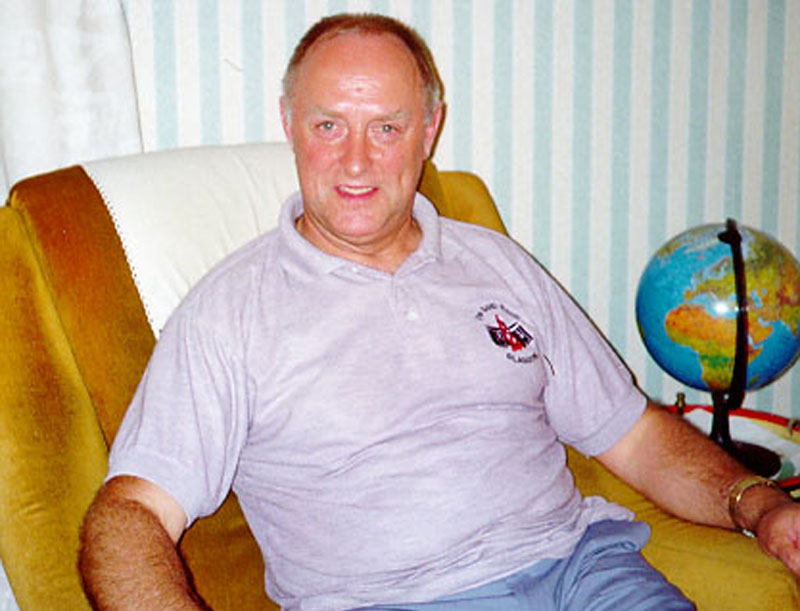
NO COMMENTS YET